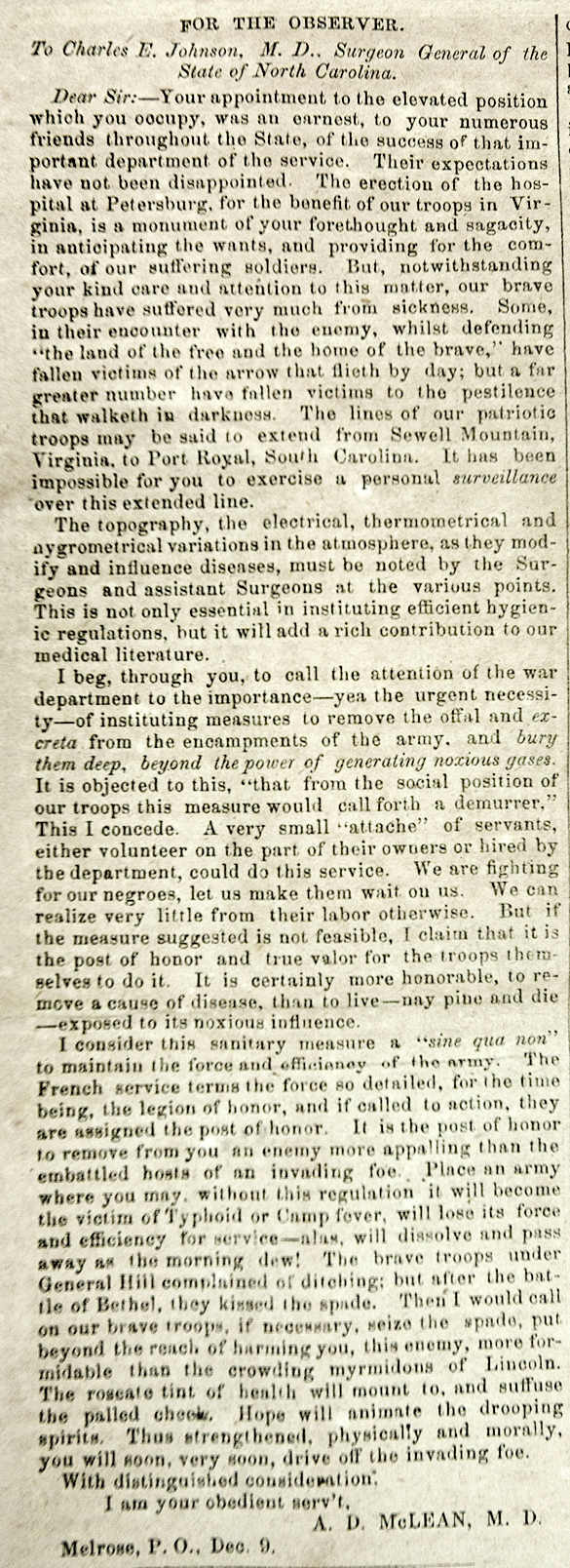Item Description: Letter, 9 December 1861, from A. D. McLean, M. D. to Charles E. Johnson, M. D., Surgeon General of the State of North Carolina. Published in the Fayetteville Observer, 16 December 1861, page 2, column 1.
Item Transcription:
FOR THE OBSERVER
To Charles E. Johnson, M. D., Surgeon General of the State of North Carolina.
Dear Sir:—Your appointment to the elevated position which you occupy, was an earnest, to your numerous friends throughout the State, of the success of that important department of the service. Their expectations have not been disappointed. The erection of the hospital at Petersburg, for the benefit of our troops in Virginia, is a monument of your forethought and sagacity in anticipating the wants, and providing for the comfort, of our suffering soldiers. But, notwithstanding your kind care and attention to this matter, our brave troops have suffered very much from sickness. Some, in their encounter with the enemy, whilst defending “the land of the free and the home of the brave,” have fallen victims of the arrow that flieth by day; but a far greater number have fallen to the pestilence that walketh in darkness. The lines of our patriotic troops may be said to extend from Sewell Mountain, Virginia, to Port Royal, South Carolina. It has been impossible for you to exercise a personal surveillance over this extended line.
The topography, the electrical, thermometrical and aygrometrical variations in the atmosphere, as they modify and influence diseases, must be noted by the Surgeons and assistant Surgeons at the various points. This is not only essential in instituting efficient hygienic regulations, but it will add a rich contribution to our medical literature.
I beg, through you, to call the attention of the war department to the importance—yea the urgent necessity—of instituting measures to remove the offal and excreta from the encampments of the army, and bury them deep, beyond the power of generating noxious gases. It is objected to this, “that from the social position of our troops this measure would call forth a demurrer.” This I concede. A very small “attache” of servants, either volunteer on the part of their owners or hired by the department, could do this service. We are fighting for our negroes, let us make them wait on us. We can realize very little from their labor otherwise. But if the measure suggested is not feasible, I claim that it is the post of honor and true valor for the troops themselves to do it. It is certainly mor honorable, to remove a cause of disease, than to live—nay pine and die—exposed to its noxious influence.
I consider this sanitary measure a “sine qua non” to maintain the force and efficiency of the army. The French service terms the force so detailed, for the time being, the legion of honor. It is the post of honor to remove from you an enemy more appalling than the embattled hosts of an invading foe. Place an army where you may, without this regulation it will become the victim of Typhoid of Camp fever, will lose its force and efficiency for service—alas, will dissolve and pass away as the morning dew! The brave troops under General hill complained of ditching; but after the battle of Bethel, they kissed the spade, put beyond the reach of harming you, this enemy, more formidable than the crowding myrmidons of Lincoln. The roseate tint of health will mount to, and suffuse the palled cheek. Hope will animate the drooping spirits. Thus strengthened, physically and morally, you will soon, very soon, drive off the invading foe.
With distinguished consideration,
I am your obedient serv’t.
A. D. McLean, M. D.
Melrose, P. O., Dec. 9.
Citation: Fayetteville Observer, 16 December 1861, page 2, column 1. Call number: VC071 C748 folder 5. North Carolina Collection, Wilson Library, University of North Carolina at Chapel Hill.
Additional reading: Regulations for the Medical Department of the military forces of North Carolina. Raleigh, N.C. : Strother & Marcom, 1861.


